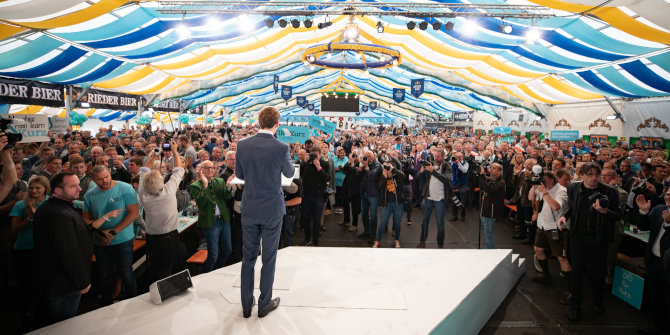 Pro-independence parties won a majority of seats in the Catalan elections on 27 September, which were billed by several parties as a de facto referendum on Catalonia’s secession from Spain. As Anwen Elias writes, however, the elections have failed to provide a concrete answer to the independence question. With the pro-independence parties securing less than 50 per cent of the overall vote share, and with uncertain negotiations ahead between the largest pro-independence coalition Junts pel Sí (Together for Yes) and the smaller Candidatura d’Unitat Popular (Popular Unity Candidacy), it remains unclear what lies next for both Catalonia and Spain.
Pro-independence parties won a majority of seats in the Catalan elections on 27 September, which were billed by several parties as a de facto referendum on Catalonia’s secession from Spain. As Anwen Elias writes, however, the elections have failed to provide a concrete answer to the independence question. With the pro-independence parties securing less than 50 per cent of the overall vote share, and with uncertain negotiations ahead between the largest pro-independence coalition Junts pel Sí (Together for Yes) and the smaller Candidatura d’Unitat Popular (Popular Unity Candidacy), it remains unclear what lies next for both Catalonia and Spain.

At stake in Sunday’s Catalan parliamentary elections was Catalonia’s future relationship with Spain. That this became the main issue in regional elections, rather than the subject of a referendum (as in Scotland), is the result of a stand-off between Catalan and Spanish political forces that has been building for several years. The results give little confidence of a speedy or consensual solution to the Catalan question.
Support for Catalan independence has grown in recent years. Efforts to increase Catalan autonomy within the Spanish state have been frustrated by a Spanish Constitutional Court perceived to be highly politicised, and a central government intent on clawing back control over several regional policy competencies.
Historically, Catalan (and Basque) nationalists have been very effective in negotiating further transfers of power with Madrid. But the ruling right-wing Partido Popular (Popular Party) has flatly refused to consider further increases in Catalan self-government, and an attempt to hold an independence referendum last year was ruled to be unconstitutional.
With all negotiation options closed down, pro-independence parties in Catalonia have been left little choice but to frame the regional elections as a de facto referendum on independence. But, contrary to the proclamations of both supporters and opponents of independence, the election results provide no clear answer to what Catalonia’s future relationship with the Spanish state should be.
A complex and fragile situation
Pro-independence parties have secured the largest number of seats in the Catalan parliament, but have fallen short of a majority of all votes cast (47.8 per cent). So the democratic legitimacy of any process aimed at secession from Spain will be highly contested.
Forming a pro-independence majority government to move this process forward will also be challenging as the largest pro-independence coalition Junts pel Sí (Together for Yes) needs the support of the smaller Candidatura d’Unitat Popular (Popular Unity Candidacy) to form a majority Catalan government. The latter’s preference for immediate and unilateral secession from Spain is one of many issues that divide the pro-independence parties, making any governing agreement difficult to achieve and maintain.
Opponents of Catalan independence have interpreted the election result as proof that the majority of Catalans want their nation to remain within the Spanish state. But this is a heterogeneous group of parties, with no shared vision of how to accommodate the Catalan nation within Spain or common strategy for overcoming the current impasse. Divergent electoral performances in this contest, and the need to position themselves ahead of a Spanish general election before the end of the year, make it highly unlikely that these parties will come together to confront the secessionist threat.
Particularly striking in these elections is the shifting balance of power between old and new state-wide parties: Ciutadans (Citizens) becomes the second largest party in the Catalan parliament, having taken votes from an increasingly unpopular Partido Popular, whilst the Partit dels Socialistes de Catalunya (Catalan Socialist Party) has been relegated to third party in the Catalan parliament.
The Catalan elections have resulted in a political situation that is complex and fragile. There is a clear dissatisfaction with Catalonia’s status quo within Spain, but yesterday’s elections only served to further polarise political debate between supporters and opponents of Catalan independence. Resolving the Catalan question will require stepping back from these extremes, to explore other options for enhancing Catalan self-government within the Spanish state.
It is difficult to imagine how this can be done in the current climate of hostility and distrust between Catalonia and Madrid. Such discussions may have to wait until the results of the Spanish general election in December are known, when a different political landscape may offer new opportunities to address Catalan grievances. But the Catalan elections also suggest that this broader political landscape is changing in fundamental ways. The emergence of new political actors, with different views on how the state should manage territorial tensions within its borders, may further complicate the difficult task of resolving the Catalan question.
Please read our comments policy before commenting.
Note: This article gives the views of the author, and not the position of EUROPP – European Politics and Policy, nor of the London School of Economics.
Shortened URL for this post: http://bit.ly/1Fwtwp8
_________________________________
 Anwen Elias – Aberystwyth University
Anwen Elias – Aberystwyth University
Anwen Elias is Senior Lecturer in Comparative Politics at Aberystwyth University.





This is a balanced commentary on the election and the present complex and rapidly changing spanish political landscape. Many thanks to its author.